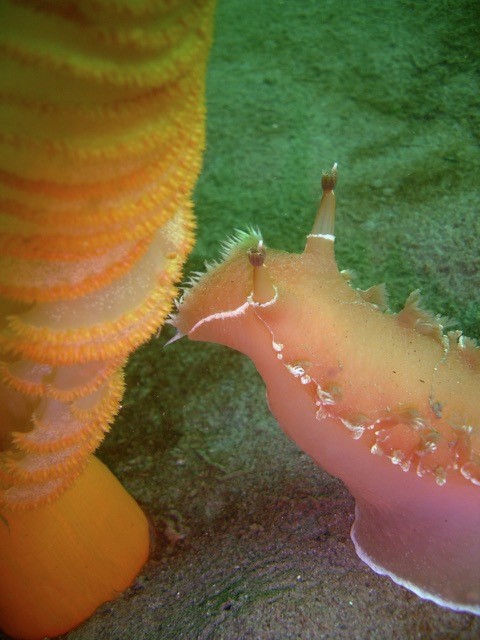Geomagnetic Orientation Behavior in the PNW Sea Slug Tritonia: Research on a Not Yet Understood Sensory Mode with Implications for Survival in a Changing Climate
Tritonia orienting to bite polyps from a sea pen
Western Washington University has shifted to entirely online classes for Spring, 2020. As such, the Huxley Speaker Series is revisiting some of our favorite presentations from the Archives.
This talk was originally presented as part of the Huxley Speaker Series in Spring 2018.
Nudibranch mollusks not surprisingly orient to optimize finding and capturing sea pens, their prey. How do these sea slugs do it in a complex sensory environment where odor cues are carried on water currents driven by tides, seasons, local geography and changing climate factors? Evidence from field work using SCUBA as well as electrophysiological recording from individual brain cells suggest they detect the earth’s feeble magnetic field and use it to determine the shoreward direction. This information also provides critical cues to the location of their prey.

About the Speaker

Dennis Willows, UW Professor Emeritus of Biology, is a neurobiologist interested the way nervous systems are wired to drive coherent behavior. He was Director of the UW Friday Harbor Laboratories and Director of the Neurobiology Program of the US National Science Foundation.
Environmental Speaker Series
The Environmental Speaker Series is hosted by the College of the Environment at Western Washington University.
The Series is free and open to the public. Talks are held each Thursday at 4:30 pm in Academic Instructional Center West room 204 - AW-204. Talks will also be streamed via zoom. Register with the Alumni Association for the zoom link. Paid parking is available in lot C.
Learn more about the Environmental Speaker Series
Subscribe to the Email List